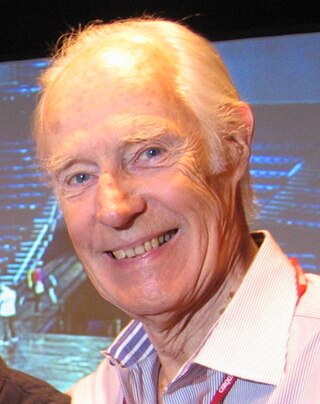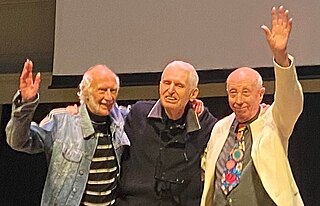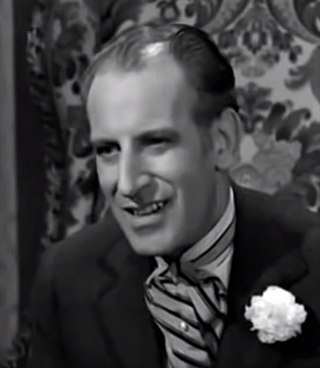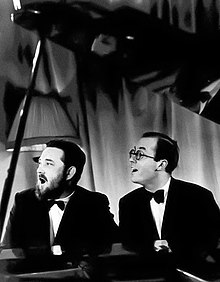
Sir George Henry Martin was an English record producer, arranger, composer, conductor, and musician. He was commonly referred to as the "Fifth Beatle" because of his extensive involvement in each of the Beatles' original albums. Martin's formal musical expertise and interest in novel recording practices facilitated the group's rudimentary musical education and desire for new musical sounds to record. Most of their orchestral arrangements and instrumentation were written or performed by Martin, and he played piano or keyboards on a number of their records. Their collaborations resulted in popular, highly acclaimed records with innovative sounds, such as the 1967 album Sgt. Pepper's Lonely Hearts Club Band—the first rock album to win a Grammy Award for Album of the Year.

The Scaffold are a comedy, poetry and music trio from Liverpool, England, consisting of musical performer Mike McGear, poet Roger McGough and comic entertainer John Gorman. They are perhaps best remembered for their successful singles "Thank U Very Much" (1967) and the UK number 1 "Lily the Pink" (1968). Since initially disbanding in 1977, the group have occasionally re-formed for performances and projects.

Flanders and Swann were a British comedy duo and musicians. Michael Flanders (1922–1975) was a lyricist, actor, and singer. He collaborated with Donald Swann (1923–1994), a composer and pianist, in writing and performing comic songs. They first worked together in a school revue in 1939 and eventually wrote more than 100 comic songs together.

Michael Henry Flanders was an English actor, broadcaster, and writer and performer of comic songs. He is best known for his stage partnership with Donald Swann.

Donald Ibrahim Swann was a British composer, musician, singer and entertainer. He was one half of Flanders and Swann, writing and performing comic songs with Michael Flanders.
A cast recording is a recording of a stage musical that is intended to document the songs as they were performed in the show and experienced by the audience. An original cast recording or OCR, as the name implies, features the voices of the show's original cast. A cast recording featuring the first cast to perform a musical in a particular venue is known, for example, as an "original Broadway cast recording" (OBCR) or an "original London cast recording" (OLCR).

A revue is a type of multi-act popular theatrical entertainment that combines music, dance, and sketches. The revue has its roots in 19th century popular entertainment and melodrama but grew into a substantial cultural presence of its own during its golden years from 1916 to 1932. Though most famous for their visual spectacle, revues frequently satirized contemporary figures, news or literature. Similar to the related subforms of operetta and musical theatre, the revue art form brings together music, dance and sketches to create a compelling show. In contrast to these, however, revue does not have an overarching storyline. Rather, a general theme serves as the motto for a loosely related series of acts that alternate between solo performances and dance ensembles.

New Faces of 1952 is a musical revue with songs and comedy skits. It ran on Broadway for nearly a year in 1952 and was then made into a motion picture in 1954. It helped launch the careers of several young performers including Paul Lynde, Alice Ghostley, Eartha Kitt, Robert Clary, Carol Lawrence, Ronny Graham, performer/writer Mel Brooks, and lyricist Sheldon Harnick.

"The Gnu" is a humorous song about a talking gnu by Flanders and Swann.

Max Adrian was an Irish stage, film and television actor and singer. He was a founding member of both the Royal Shakespeare Company and the National Theatre.
Ian Bryce Wallace OBE was an English bass-baritone opera and concert singer, actor and broadcaster of Scottish extraction.

The Temperance Seven is a British band originally active in the 1960s, specialising in 1920s-style jazz music. They were known for their surreal performances.

At the Drop of a Hat is a musical revue by Flanders and Swann, described by them as "an after-dinner farrago". In the show, they both sang on a nearly bare stage, accompanied by Swann on the piano. The songs were linked by contemporary social commentary, mostly by Flanders. After a long London run the show played in the US, Switzerland, and on tour in Britain.
Alexander H. Cohen was an American theatrical producer who mounted more than one hundred productions on both sides of the Atlantic. He was the only American producer to maintain offices in the West End as well as on Broadway.
Henry Krieger is an American musical theatre composer. He most notably wrote the music for the Broadway shows Dreamgirls, The Tap Dance Kid (1983), and Side Show (1997).

"Have Some Madeira M'Dear", also titled "Madeira, M'Dear?", is a darkly comic song by Flanders and Swann.
Fresh Airs was a revue produced by Laurier Lister that opened in Brighton in 1955. It was the last in his series of "Airs" revues before Flanders & Swann started performing for themselves in At the Drop of a Hat.

Sondheim on Sondheim is a musical revue consisting of music and lyrics written by Stephen Sondheim for his many shows. It is conceived and directed by James Lapine. The revue had a limited run on Broadway in 2010.
The musical Hadestown, written by American singer-songwriter Anaïs Mitchell and based on her 2010 studio album of the same name, has had two official cast recordings. In addition, various songs from Hadestown were re-recorded by Mitchell for her 2014 studio album Xoa, including the musical's opening number "Anyway the Wind Blows" which had not appeared on the original concept album. The song "Why We Build the Wall" has been covered by a variety of artists, including English singer-songwriter Billy Bragg for his 2017 EP Bridges Not Walls, Ben Fisher, Ben Dunham, Lilli Lewis, and Robert Neustadt.
A Song of Patriotic Prejudice is a 1963 comedy song by musical duo Flanders and Swann. It was originally released on their At the Drop of Another Hat album. The song is a satire of contemporary attitudes towards foreigners in the wake of the country being on the winning side after World War II but losing an empire, with consequent uncertainty as to the position of the country on the new world. It is virulent against the other nations within the United Kingdom, referencing the common stereotype of the Welsh, the Scottish and the Irish. It then moves on to other nations, including the French and the Greeks. Scholars have debated the degree to which the song is a serious critique, but it has found continued currency into the 21st century as a symbol of English nationalism, particularly in the aftermath of Brexit and other social phenomena.













